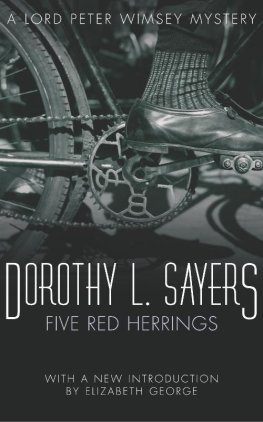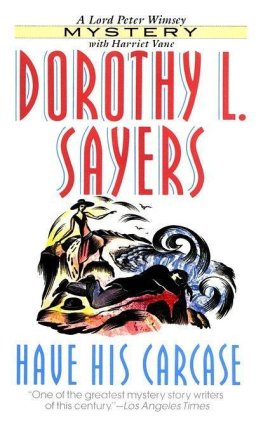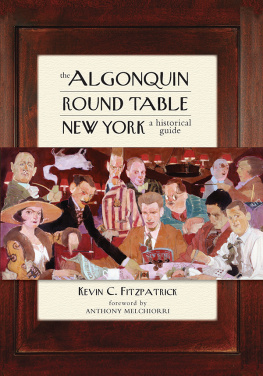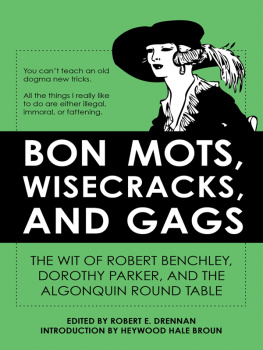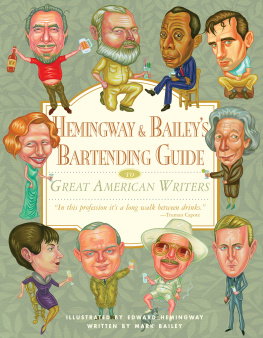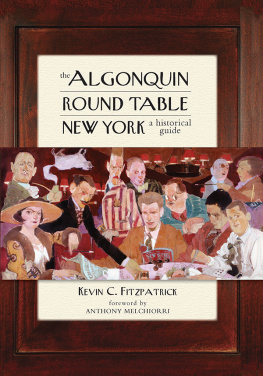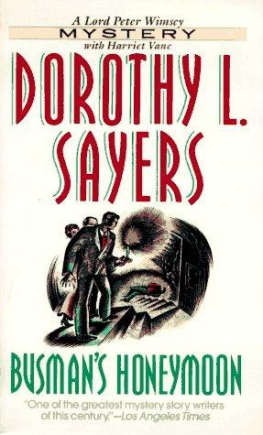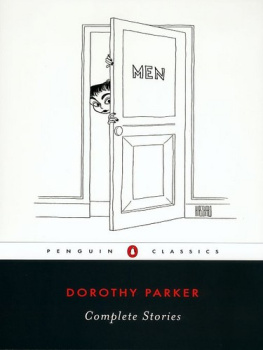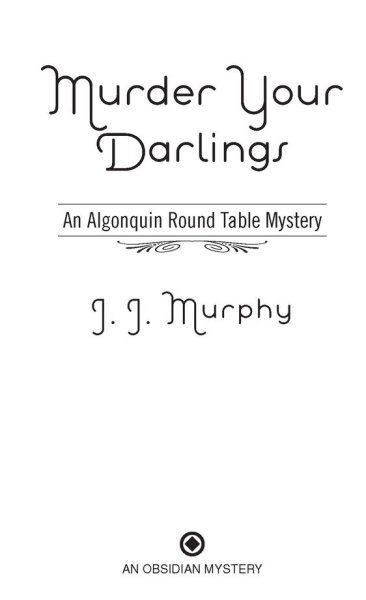Table of Contents
MURDER WAS NOT ON THE MENU....
Oh, its nothing much, Case said, rocking back on his heels. A little matter of a dead man in the dining room. Your waiter, Luigi, found him under your celebrated Round Table.
Benchley, as if reading Dorothys mind, said, You think it was something he ate, Frank?
Case frowned at him.
Not a chance, ORannigan said in all seriousness. It was murder. He was stabbed.
Stabbed? Woollcott said. In the middle of the Algonquin dining room?
Stabbed through the heart, the detective said.
Just a minute, Sherwood said. Was this someone from our circle?
Frank Case shook his head.
That aint the half of it. He was stabbed, ORannigan grumbled emphatically, with a fountain pen.
Benchley looked to Dorothy. Mightier than the sword, indeed.
She replied, He took his writing a little too close to heart.
To my own little vicious circle
Karin, Betsy and Mary Jane
Whenever you feel an impulse to perpetrate a piece of exceptionally fine writing, obey itwholeheartedlyand delete it before sending your manuscript to press. Murder your darlings.
Sir Arthur Quiller-Couch
Kill your darlings.
attributed to William Faulkner
In all reverence I say Heaven bless the Whodunit, the soothing balm on the wound, the cooling hand on the brow, the opiate of the people.
Dorothy Parker
AUTHORS NOTE
Although real people walk through the pages of this book, it is a work of fiction. I do believe that Dorothy Parker and the other members of the Algonquin Round Table would have encouraged the embellishment of fact to tell a good storyand I hope you will as well.
FOREWORD
In the 1920s, there were no Internet, no wireless phones, no satellite TVno TV at all. Even radio wasnt commonplace until the later twenties. Instead of text messages and e-mail, people sent telegrams or employed messenger boys. For music at home, they listened to a Victrola or sang around a piano.
For entertainment, New Yorkers had dozens of theaters in which to see plays and a number of movie palaces where they could see silent films. (Talkies didnt arrive until the later twenties, too.)
For information, New Yorkers lacked twenty-four-hour cable news networks. But they did have a dozen daily newspapers to choose from. Presses ran day and night, printing morning editions, afternoon editions and special editions (Extra! Extra! Read all about it!).
At this time, the people who wrote the news also became the news. A new class of writers, editors and critics emerged. A loose-knit group of tenand their assorted friendsgathered around a large table for lunch at the Algonquin Hotel. They went to the Algonquin because it welcomed artists and writersand because it was convenient and inexpensive. Their daily lunch gatherings were known more for wisecracks and witticisms than for the food they ate. But they buoyed one another with merriment and camaraderie. They thought the fun would never end.
Chapter 1
Dorothy Parker stared at the pair of motionless legs protruding from beneath the Algonquin Round Table.
This, she thought, is what you get for showing up early.
She was never early for anything. Often, she was the last one to arrive. Today, despite her best intentions, someone else had arrived before her.
Under the table before lunchtime? she said to the pair of legs. Even I wait until after noon to wind up there.
The legs didnt move.
Nobody else was in the darkened dining room. The room had no windows, and the lights were dimmed. It was unusually silent. She could hear only the muted clatter coming from the kitchen as the chef and his staff busily prepared lunch. But no waiters emerged through the swinging door.
Her dark, soulful eyes clouded over. Those demure eyes belied her sharp mind. They peered out from the shadows of a very pretty, but now troubled, face.
She gently nudged the toe of her little scuffed shoe against one of the legs. You should stand up when a lady enters, she said. Hurry up. One might come in at any moment.
Still, the legs did not stir. She knew something was dreadfully wrong, of course. But joking about it was more appealing than shrieking.
The legs belonged to a short, slender man. Even in the dimness, she could see that his black shoes were expensive, narrow and highly polished. Dove gray spats covered the tops of his shoes and his ankles. Above the spats, the mans trousers were charcoal gray and pin-striped. Above the trousers, the immaculate white tablecloth draped down like a shroud.
Dorothy prodded the legs again, harder this time. Again, no response.
She glanced once more at the door to the kitchen. Still closed. She turned to look toward the entrance to the dining room. People milled about in the lobby, just a few paces away.
She should go. She should get someone.
She didnt. Curiosity got the better of her. She leaned forward and lifted the tablecloth. She saw the mans vest. It didnt moveit didnt rise and fall with his breath. Then she saw something thin and metallic sticking out of his chest, surrounded by a dark crimson stain.
That was enough. She dropped the tablecloth. She hurried toward the kitchen door and flung it open. The kitchen was bright and busy. The waiters, the kitchen staff and the chef fell silent and turned to look at her.
Before she could say anything, Jacques, the chef, stopped her with an impatient stare. He halted his mallet in midair over a flattened fillet of veal.
We know, he said, exasperated. There is a dead man in the dining room. We told Mr. Case, and he called the police. Now, unless you know what killed him, dont bother us.
Dorothy quickly recovered her composure. Perhaps it was something he ate.
She turned on her heel and let the door swing closed. Behind the door, she could hear the chef cursing at her in French. Without a glance toward the body under the Round Table, she strolled calmly through the dark toward the threshold to the well-lit hotel lobby.
Across the lobby, she spotted her longtime friend and coworker at Vanity Fair magazine, Robert Benchley. He stood in the light of one of the large, sunny windows at the front of the hotel. He was busy fiddling with his pipe and spilling tobacco on his sleeve.
Seeing him, as she did every day, she felt a subtle thrill. She wasnt nervous or anxious. Just the opposite. Robert Benchley was perhaps the only person with whom she felt completely at ease. When she was alone, she often felt distracted, isolated, on edge. When she was with him, she felt like herself.
She couldnt wait to tell him about the bodyin her most casual, offhanded way. He would be horror-struck, appalled and thoroughly amused. He would
Suddenly, a hand touched her sleeve.
Excuse me? Miss Parker?
She turned to face a short, skinny, droopy-eyed young man in a baggy houndstooth suit. His whisper-thin mustache and scraggly beard, which barely covered a narrow chin, made the young man look like a suffering artist or a homeless vagrantDorothy couldnt decide which.
Its Mrs. Parker, she corrected him. May I help you?
Im a writer, from Mississippi. He nervously shifted from foot to foot. That is, I want to be.
You want to be from Mississippi or you want to be a writer?
He wasnt offended. In fact, he smiled. It was a tender smile, she thought.


